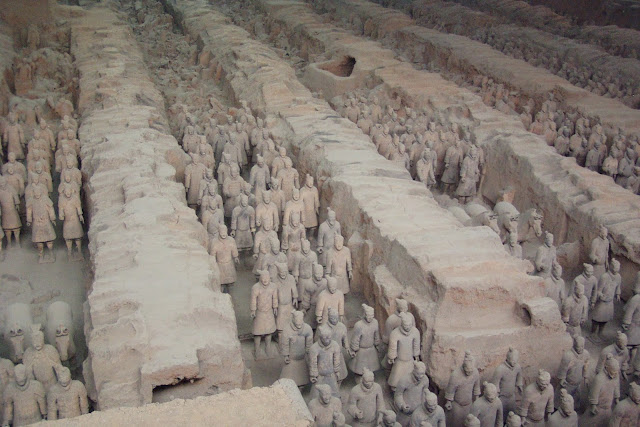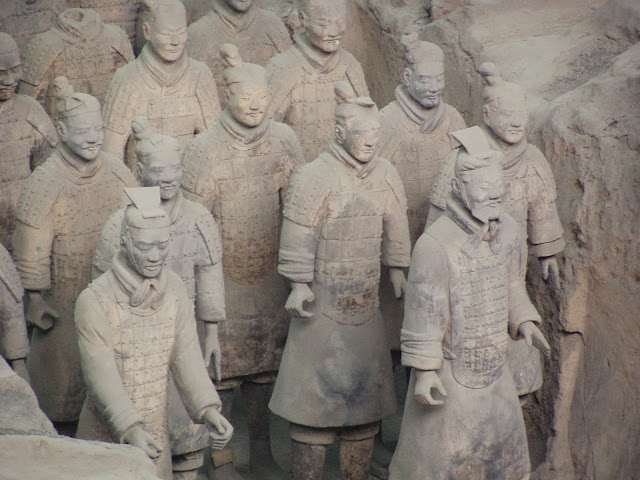The grave of the first emperor of China was constructed about 2 centuries before Christ and only discovered in 1974. A similar story like the discovery of Machu Pichu in Peru.
The tomb of the Emperor located in a hill behind the Terracotta Army is not opened yet. From information found on the site the tomb would not only be protected by the clay army of more than 8.000 soldiers but also by booby traps and a river of toxic liquid. The future will probably reveal its true nature.
We were astonished by the size of the main hall and the rows of soldiers in front of us. They all have different faces and expressions. At the time the archaeologists removed the soil on top of the statues they were still coloured but the paint disappeared fast after contact with air. Some of the corridors in which soldiers stand guard are still closed for this reason. One hopes to find a technology which could preserve the colours.
After visiting the archaeological site you enter a museum which holds many items of the region from the Qin dynasty. In the shop, my wife convinced me not to buy a full size Terracotta soldier replica for in our living room. I still regret this decision.
Het graf van de eerste Keizer van China dateert uit de tweede eeuw voor Christus en werd pas ontdekt in 1974. In feite een soortgelijk verhaal als de ontdekking van Machu Pichu in Peru.
De graftombe ligt verborgen in de heuvel achter het Terracotta Leger en werd nog niet geopend. Uit informatie gevonden op de site zou het lichaam van de Keizer niet alleen door het 8.000 man sterke Terracotta Leger worden beschermd maat ook door boobytraps en een rivier van giftig kwikzilver. De toekomst zal de ware aard van het graf waarschijnlijk wel prijsgeven.
We waren verbaast van de enorme afmetingen in de hoofdhal waarin vele rijen soldaten ons aankeken. ze hebben allemaal een ander gelaat en expressie. Op het moment dat de archeologen ze hebben opgegraven waren ze nog gekleurd, maar deze verf verdween heel snel door het contact met zuurstof. Dit is dan ook de reden waarom vele gangen nog steeds niet geopend zijn. Men werkt hard aan een technologie om de kleuren in stand te kunnen houden.
Na het bezoek van de archeologische plaats kan je vele objecten van de Qin Dynasty bewonderen in het er naast gelegen museum. In de museumwinkel heeft mijn vrouw me overtuigt geen levensgrootte replica van een Terracotta soldaat te kopen. Deze wou ik graag in onze woonkamer plaatsen. Hier heb ik nog steeds spijt van.
Previous Xian article:
A bicycle tour on the city wall of Xian
Previous Archeological article:
The ancient town of Ephesus with the library of Celsus
Return to main page
The Way Birds Sing
21 hours ago













i've seen photos of this remarkable site. just amazing.
ReplyDeleteEen heel indrukwekkende plaats!
ReplyDeleteimagine being the guys that discovered this
ReplyDeleteGreat captures, Filip. When I visited, the excavation was just beginning. Even so, it was awe-inspiring. I still have some souvenir soldiers I brought back with me.
ReplyDeleteAmazing photos !!!
ReplyDeleteThis summer, here in Finland were Terracotta exhibition, but I did not have time to go there, it was not in Helsinki .. pity.
Greetings
Wat moet dat GEWELDIG zijn om te bezoeken...... top foto's Filip
ReplyDeleteik heb een gedeelte hiervan gezien tijdens een expositie in Nederland.
Groetjes, Joop
Dat moet wel indrukwekkend zijn geweest dit in het echt te zien. Mooie foto's.
ReplyDeleteLike yourselves we thought The Terracotta Army was amazing, We had an excellent guide who felt that the correct way to do the tour was back to front leaving the great hall till last and we agreed.
ReplyDeletebijzonder indrukwekkend...
ReplyDeletemen kan zich dit nauwelijks voorstellen
groeten
Oh my, amazing and haunting at the same time.
ReplyDeletereally breathtaking! I am impressed...
ReplyDeletehad er nog nooit over gelezen maar dit is wel een heel speciaal stukje geschiedenis.
ReplyDeleteBizar om te zien, bedankt van het delen!!!
een interessant bericht onderbouwt met een mooie fotoserie. Fijn weekend, Dietmut
ReplyDelete